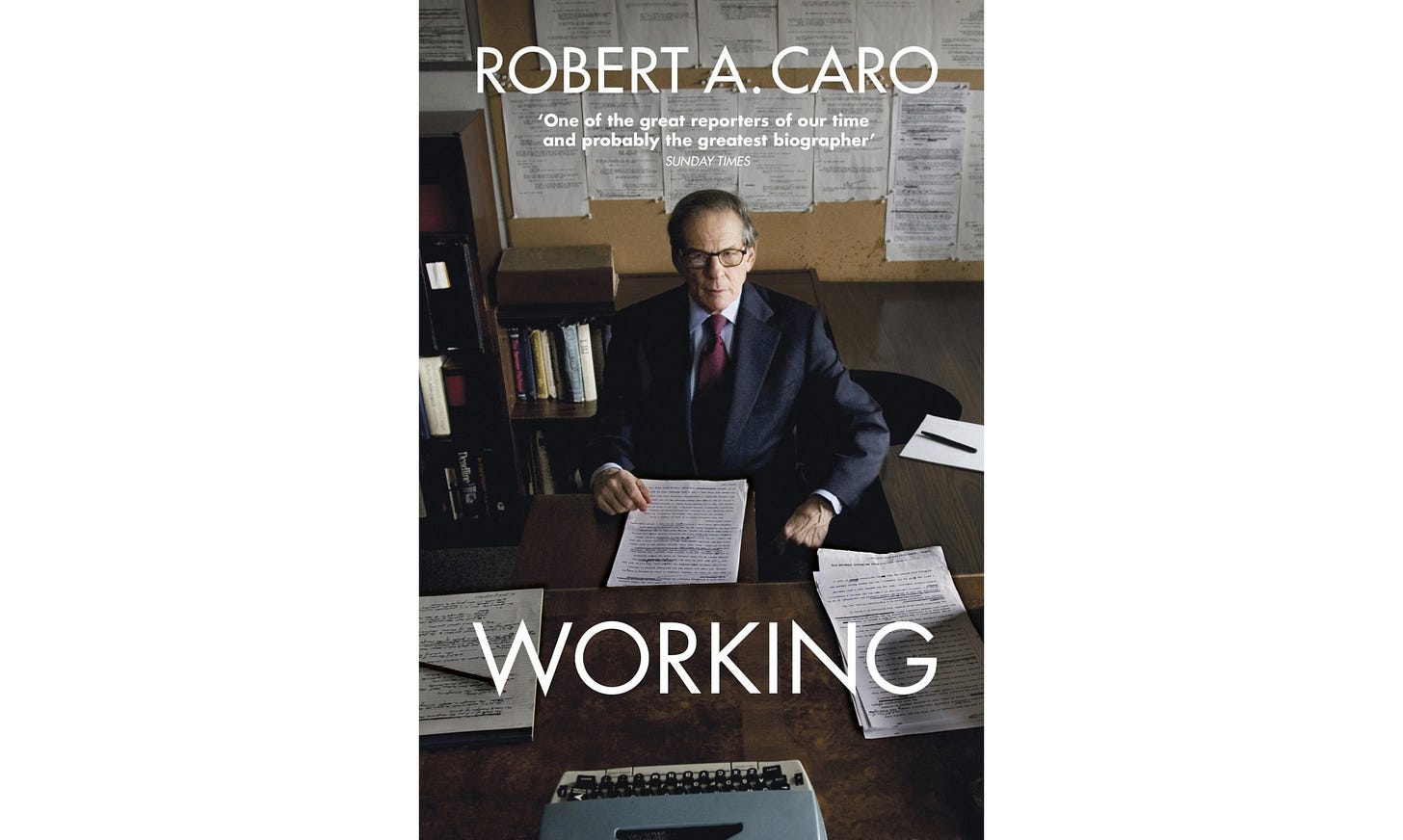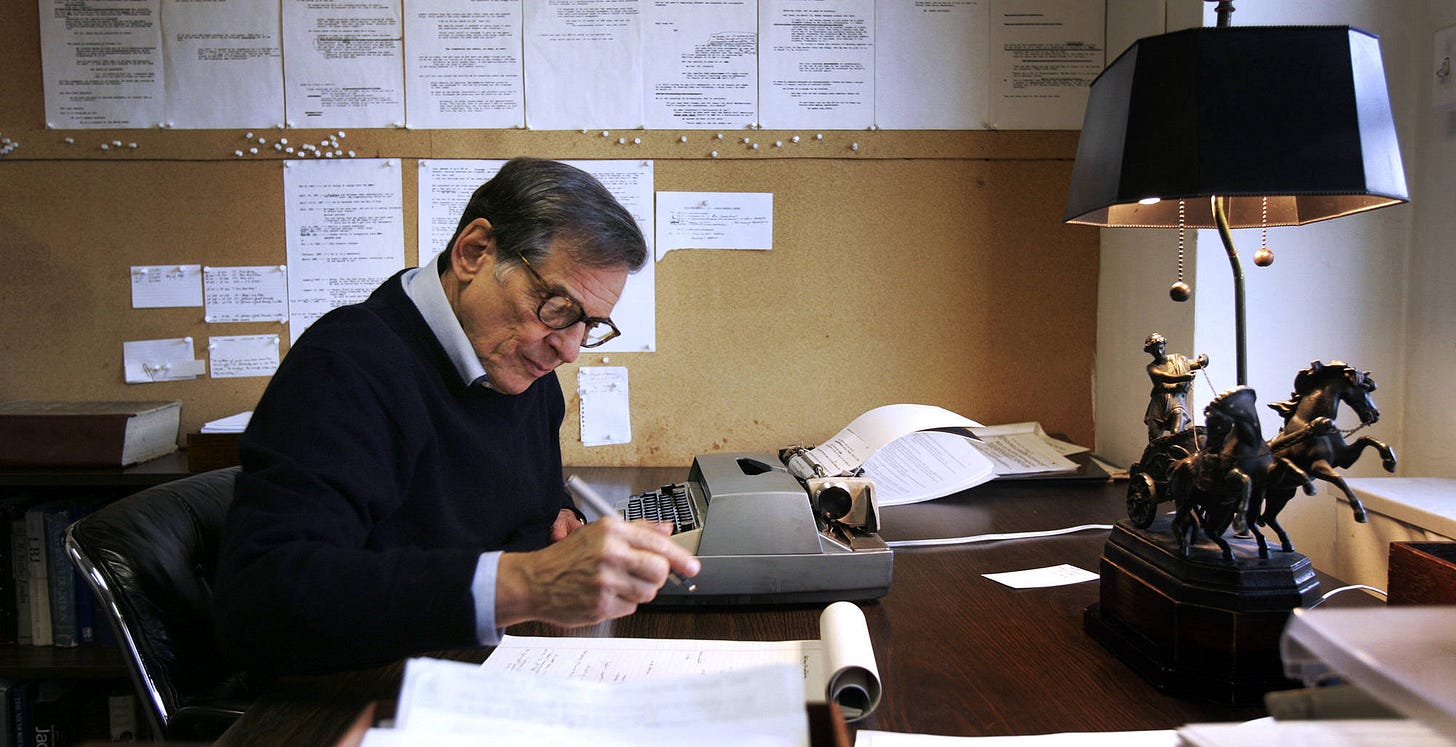Robert Caro: A life long pursuit of writing political power
A book review of Robert A. Caro's new book Working
Dear friends,
Welcome to another issue of Profiles in Leadership, the leadership newsletter for aspiring leaders. This week’s issue is devoted to Robert A. Caro, a renowned biographer, and his new book Working.

Review: Robert Caro—A life long pursuit of history on political power
Flipping open The Path to Power, the first of the four-volume The Years of Lyndon Johnson by the Pulitzer-winning Robert Caro, I was surprised to find that its first chapters are almost devoid of Lyndon B. Johnson (LBJ), filled instead with poetic prose of the nature, landscape, and geography of the Texas Hill Country. I felt as if being there with Johnson’s forefathers, venturing into the Hill Country with admiration of its beauty and ambition to make use of its seeming abundance, only to be devastatingly disappointed by its real barrens. Little did I know that this is Robert Caro’s trademarked style of research and writing, both of which we now have a glimpse of from his new book Working, a collection of essays and interviews old and new.

More precisely, Working is a mixture of his personal story and his methods in writing biographies. Freshly graduated from Princeton with literary talent, Caro took a journalist job to fend for his family. Despite winning a few minor journalist awards, Caro was doomed to be a bad journalist, especially by today’s standard when one has to jump quickly from story to story, churning up several pieces of articles per day. With an inquisitive nature, Caro hated having to write an article when there were still questions left to ask—there would always be so many questions he wanted to ask. That, and his fascination with power, led to a career switch from journalist to author, which in turn led to two biographies on political power and its real impact on humans.
“Of course there was more. If you ask the right questions, there always is. That’s the problem.”
His two biographies of Robert Moses and Lyndon B. Johnson are the same tale told on two levels, one municipal and one national. Both are master manipulators with multifaceted motives who bent institutions and people to their will. In his first book The Power Broker, Robert Moses the visionary built expressways, bridges, and parks that would define what New York City is today, but Moses the schemer displaced over half a million of poor people without a drop of guilt. With the success of The Power Broker, Caro moved on to a presidential figure: Lyndon Johnson the compassionate passed the Civil Rights Act, the Voting Rights Act, Medicare, Medicaid, Head Start, and seventy different education bills, yet Lyndon Johnson the ruthless dragged America deeper into the muddy Vietnam War, forever scarring a generation of people.
“Turn every page. Never assume anything. Turn every goddamned page.”
If his methods must be boiled down into bullet points, then there are basically two tips. The first is his former boss’ advice on investigative journalism—turn every goddamned page. And pages he turned, always with his wife Ina, to unearth the secret and untold tales of Lyndon Johnson. One example involved Johnson’s inexplicable rise of status as among junior congressmen around October 1940. Thomas “Tommy the Cork” Corcoran, an aide to Franklin Roosevelt, explained to Caro that Johnson’s status changed because of money, but Caro wouldn’t be able to find anything on paper to write about. With perseverance, Caro continued flipping pages in the LBJ Presidential Library, finally discovering a piece of evidence. Once he hit the right spot, secrets began ushering out of earth like crude oil, revealing the depth of LBJ’s well of secrecy.

“By ‘a sense of place’, I mean helping the reader to visualize the physical setting in which a book’s action is occuring...The action thereby becomes more vivid, more real, to him, and the point the author is trying to make about the action, the significance he wants the reader to grasp, is therefore deepened as well.”
The second is offering the readers a sense of the place, which requires painstakingly reconstructing the past by going one step further than acknowledging the commonly accepted. For instance, every journalist and biographer would agree that LBJ was ruthless. They accepted this common notion and stopped there. What Caro wanted to explain is why he was so ruthless, so that he could help the readers feel as if they were part of that experience. Much of it is the place LBJ came from, so Caro and Ina went down to the Hill Country and lived there for three years, during which they unlocked the closed chests of locals who knew LBJ’s youth but were too reticent and reluctant to speak to “portable journalists” who came and left quickly, without the willingness to understand their culture and history.
The interviews Caro conducted often seem like a therapy session. When he took LBJ’s younger brother Sam Houston Johnson to Johnson’s childhood house, Caro would have Sam sit by the dining table. Wanting only Johnsons from the Johnson City in the scene, Caro would sit behind Sam, away from the table, and ask Sam numerous questions so that Sam could gradually reconstruct from his memory the loud and unhappy arguments that LBJ had with his father in great details. These interviews are like removing the blackberry plants in your garden. You shovel hard around the plants, thinking you’d revealed the roots, only to find out that it was but one of the many interconnected roots hidden beneath earth. Such is the challenge of writing LBJ’s time and life.

Throughout the book, time is the hidden tension that links all his stories together. Time in chasing after the last living people he could interview from the Johnson era and time in waiting for these people to open up and reveal their secret truths. Like how Sam Houston Johnson changed with time, with cancer, and in the end offering completely different tales on the young Lyndon Johnson. Or time in finding the presumably dead Luis Salas who stole votes for Johnson and lied under oath to help him win a senate election victory in 1948 against Coke Stevenson. But it is also time in writing books slowly, for he can only write his style slowly, and time in wondering if he, at 83, can still finish the last Johnson book or start his personal biography. Caro’s constantly in a game with time, but he will not bend his meticulous research, his longhand drafts, and his typewriter.
Closing Working, I suddenly realized that Robert Caro is writing Moses and LBJ with his own life and these thick, heavy books reveal as much about Caro and his wife’s life, work ethic, and inquisitive spirit as about the characters of the great political manipulators under his pen. The Economist calls Caro America’s biographer in chief. That might be an understatement. For me, Caro is more a chief expert on political power, a talented storyteller, and a Sherlock Holmes combined. In this commercial age when writers are mass-manufacturing bestselling books that will soon be forgotten, Caro, who never assumed any position of power, takes his time to continue his lifelong pursuit in understanding and writing about power.
A truly powerful writer.
Thin Slice
An interview trick from the master interviewer:
Interviews: silence is the weapon, silence and people’s need to fill it—as long as the person isn’t you, the interviewer. Two of fiction’s greatest interviewers—George Simenon’s Inspector Maigret and John le Carré’s George Smiley—have little devices they use to keep themselves from talking…Maigret cleans his ever-present pipe…Smiley takes off his eyeglasses and polishes them with the thick end of his necktie. As for myself…[when] I’m waiting for the person I’m interviewing to break a silence by giving me a piece of information I want, I write “SU” (for Shut Up!) in my notebook.
—Robert A. Caro, Working, p137
Thanks for Reading!
Make sure to click on the 💙 button to support my newsletter! Don’t forget to recommend Profiles in Leadership to your friends!


